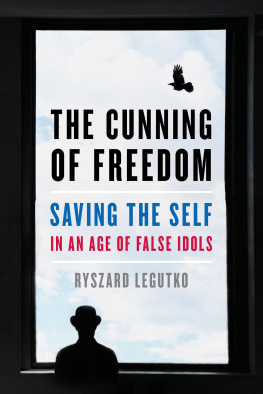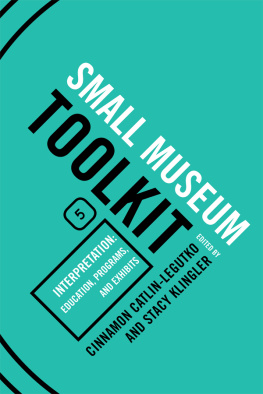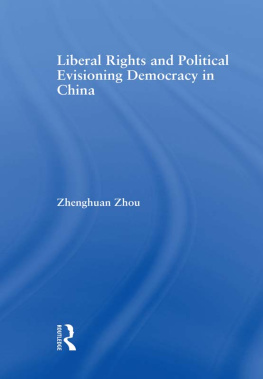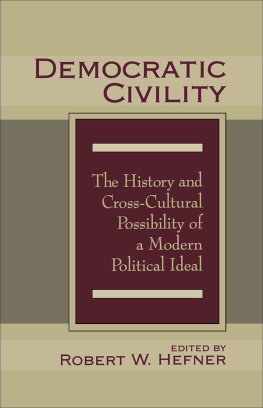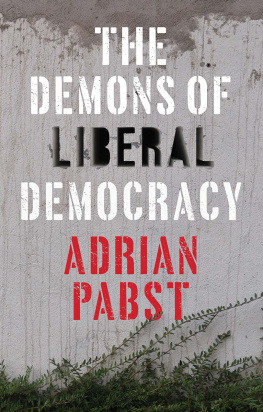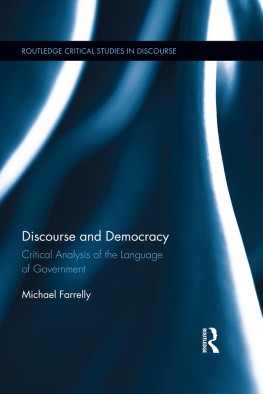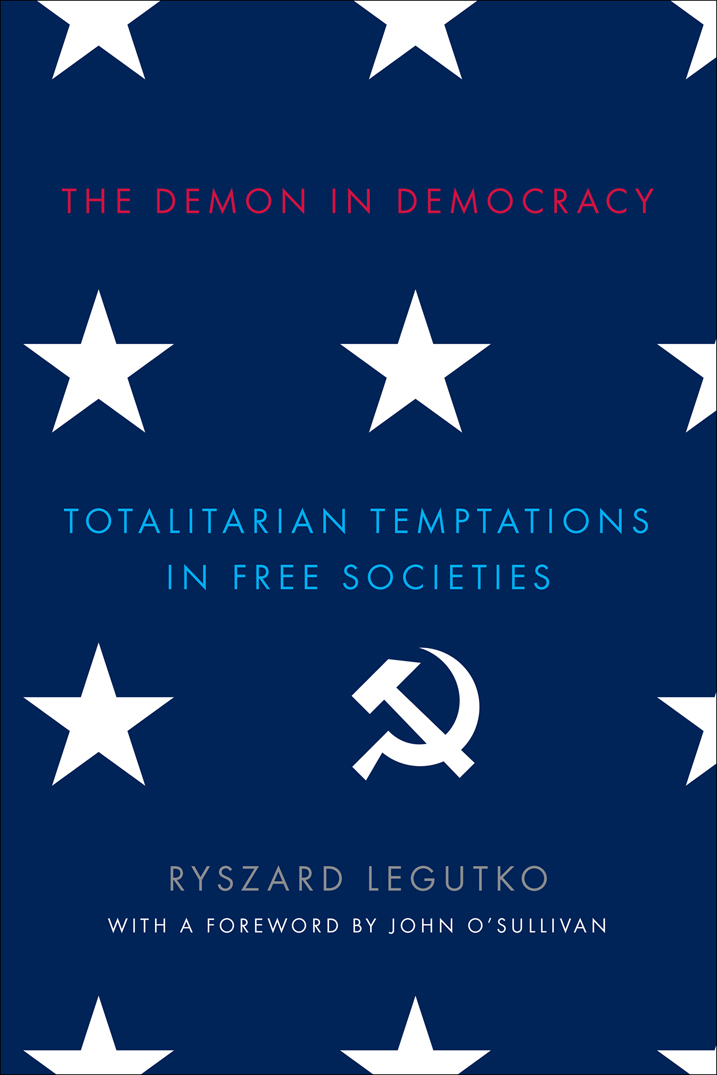

2016 by Ryszard Legutko
All rights reserved. No part of this publication may be reproduced, stored in a retrieval system, or transmitted, in any form or by any means, electronic, mechanical, photocopying, recording, or otherwise, without the prior written permission of Encounter Books, 900 Broadway, Suite 601, New York, New York, 10003.
First American edition published in 2016 by Encounter Books, an activity of Encounter for Culture and Education, Inc., a nonprofit, tax exempt corporation.
Encounter Books website address: www.encounterbooks.com
The paper used in this publication meets the minimum requirements of ANSI/NISO Z39.481992 (R 1997) (Permanence of Paper).
FIRST AMERICAN EDITION
LIBRARY OF CONGRESS CATALOGING-IN-PUBLICATION DATA
Names: Legutko, Ryszard, 1949 author.
Title: The demon in democracy: totalitarian temptations in free societies / by Ryszard Legutko.
Other titles: Triumf czlowieka pospolitego. English
Description: New York: Encounter Books, [2016] | The book first appeared in Polish under the title Triumf czlowieka pospolitego (ZYSK 2012), and the present English translation (by Teresa Adelson and the author) is a slightly shortened and somewhat modified version of the original.Title page verso. | Includes bibliographical references and index.
Identifiers: LCCN 2015044482 (print) | LCCN 2016004210 (ebook) | ISBN 9781594038648 (Ebook)
Subjects: LCSH: DemocracyPhilosophy. | CommunismPhilosophy. | Comparative government.
Classification: LCC JC423 .L43413 2016 (print) | LCC JC423 (ebook) | DDC 321.8dc23
LC record available at http://lccn.loc.gov/2015044482
The book was first published in Polish in 2012 under the title Triumf czowieka pospolitego. The present English translation is a slightly shortened and somewhat modified version of the original.
Interior page design and page composition by: BooksByBruce.com
Table of Contents
Guide
Contents

I think then that the species of oppression by which democratic nations are menaced is unlike anything which ever before existed in the world. I am trying myself to choose an expression which will accurately convey the whole of the idea I have formed of it, but in vain... I seek to trace the novel features under which despotism may appear in the world. The first thing that strikes the observation is an innumerable multitude of men all equal and alike, incessantly endeavoring to procure the petty and paltry pleasures with which they glut their lives.... Above this race of men stands an immense and tutelary power, which takes upon itself alone to secure their gratifications, and to watch over their fate. That power is absolute, minute, regular, provident and mild. It would be like the authority of a parent, if, like that authority, its object was to prepare men for manhood; but it seeks on the contrary to keep them in perpetual childhood; it is well content that the people should rejoice, provided they think of nothing but rejoicing.
ALEXIS DE TOCQUEVILLE, DEMOCRACY IN AMERICA
I have found from many observations that our liberals are incapable of allowing anyone to have his own convictions and immediately answer their opponent with abuse or something worse.
FYODOR DOSTOYEVSKY, THE IDIOT
That rabble had a mighty power over minds, for when the Lord God sends punishment on a nation he first deprives its citizens of reason. And so the wiser heads dared not resist the fops, and the whole nation feared them as some pestilence, for within itself it already felt the germs of disease. They cried out against the dandies but took pattern by them; they changed faith, speech, laws, and costumes. That was a masquerade, the licence of the Carnival season, after which was soon to follow the Lent of slavery.
ADAM MICKIEWICZ, PAN TADEUSZ
In the first few pages of this important book, Ryszard Legutko describes the oddity whereby former communists adapted far more easily and successfully than former dissidents and anticommunists to the new liberal-democratic regimes established in Central and Eastern Europe after the fall of the Berlin Wall in 1989. Others have noticed this phenomenon too, but they have usually attributed it to such reasons as the former communists having greater administrative experience, or the rules of transition protecting their power temporarily, or that, having privatized state enterprises into their own hands, they brought more resources to playing the game of politics in media and government.
These practical factors were certainly important. But they did not explain why there was so little moral resistance to the continuing dominance of the old nomenklaturas in post-communist democracies. Quite the contrary. Lightly rebaptized as social or liberal democrats, they dominated debate and formed governments. In Western Europe, public and private institutions, including European Union bodies, seemed to find former communists more congenial than former dissidents as partners in politics and business. on the rare occasions when resistance did erupt, it was usually in response to official efforts to expose still-influential communist networks, notably in intelligence agencies, or to restore state property to its original and rightful owners. It was almost as if anticommunist democrats were seen as a greater threat to the new liberal-democratic regime than those who had been its open enemies only the day before. In addition to their practical advantages, therefore, the former communists enjoyed a mysterious ideological edge.
Professor Legutko is both a prominent Polish and European statesman and a distinguished philosopher who, in addition to more conventional credentials, was once the editor of Solidaritys underground philosophy journala position that would have delighted G. K. Chesterton, as well as demonstrating the professors devotion to truth and freedom. So he is ideally equipped to analyze the mystery of this ideological edge. He finds it in an unexpected place, namely in the structure and practices of the dominant political philosophy of the modern West: liberal democracy. This is a startling discovery. It surprised Legutko himself, and he is at pains to point out that, even with all the flaws he identifies, liberal democracy is manifestly superior humanly and politically to all forms of totalitarianism.
That said, he is able to demonstrate that liberal democracy, as it has developed in recent decades, shares a number of alarming features with communism. Both are utopian and look forward to an end of history where their systems will prevail as a permanent status quo. Both are historicist and insist that history is inevitably moving in their directions. Both therefore require that all social institutionsfamily, churches, private associationsmust conform to liberal-democratic rules in their internal functioning. Because that is not so at present, both are devoted to social engineering to bring about this transformation. And because such engineering is naturally resisted, albeit slowly and in a confused way, both are engaged in a never-ending struggle against enemies of society (superstition, tradition, the past, intolerance, racism, xenophobia, bigotry, etc., etc.) In short, like Marxism before it, liberal democracy is becoming an all-encompassing ideology that, behind a veil of tolerance, brooks little or no disagreement.


